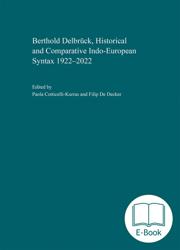This volume contains some important studies on syntax of Indo-European languages presented at the Delbrück Symposium on Indo-European Syntax on the occasion of the 100th anniversary of Berthold Delbrück's death in 2022. The book, which can be considered one of the results of a research project of a Marie Skłodowska-Curie European Fellowship (Università degli Studi di Verona), provides an overview of the current state of research on diachronic and historical syntax within Indo-European studies and highlights the changing legacy of a great researcher within specific language branches and syntactic categories.
Berthold Delbrück is considered the founding father of comparative and Indo-European syntax. His works provided the first detailed studies into several syntactic topics, such as tense, aspect and mood, word order, agreement and case functions to name only a few, in the ancient Indo-European languages known at that time, with a particular emphasis on Greek and Sanskrit. On the occasion of the centenary of his death in 2022, an honorary conference on comparative Indo-European syntax was organised in Verona within the framework of the Marie Skłodowska-Curie Project Particles in Greek and Hittite as Expression of Mood and Modality (PaGHEMMo), which was funded by the European Union’s Horizon 2020 research and innovation programme Grant Agreement Number 101018097.
This conference not only addressed the already known languages but also studied the languages discovered after his death (the Anatolian languages, Tocharian) and the texts in already known languages discovered after his death (Mycenaean Greek) but also used new scientific methods and incorporated results from other (branches of linguistic) sciences. This book provides the proceedings of that conference. As was the case with Delbrück himself, several contributions, provided for by specialists in the individual languages, deal with Proto-Indo-European, Greek and Indo-Iranian but also Latin, Celtic, Tocharian, Albanian, Old-Prussian and the Anatolian languages are studied. The topics treated in this volume rank from tense, aspect and mood, case usage, agreement, word order, formulaic and poetic language, negation, language contact, and syntactic change. The volume starts with a historiographic essay on his method and its heritage in the history of syntactic theories and reconstruction and concludes with a syntactic description of Proto-Indo-European.
This work is one of the first volumes that gathers synchronic syntactic studies into many different, also non-classical, Indo-European languages (such as Albanian, Old-Prussian and Tocharian) and topics, that provides diachronic syntactical analyses and that ventures reconstructing (part of) the syntax of Proto-Indo-European. The volume will be beneficial for historical linguistics, classicists, scholars of lesser studied languages and languages of the Near-East, and linguistics in general.
Paola Cotticelli-Kurras
Paola Cotticelli is full Professor for Historical and Comparative Linguistics at the University of Verona. Since 2007, she is Director of the Department Research Centre for Studies in metalanguage and History of Ideas. She participated and directed many research programs in the field of the History of Ideas, Linguistic Concepts, and Grammarians and linguistic Historiography (PRIN 2002–2004; 2011–2013; [2017–]2020–2024; PRIN 2022[2023-2025] as PI of projects of national relevance on the history of some syntactic categories in the Middle Ages, and in Modern ages). In 2007, she published Lessico di Linguistica (Edizioni dell’Orso, Alessandria). Other research fields: Hittitology, Historical Linguistics and Ancient languages, Graphematics. In 2014–2016, she was PI of a Grant by the Foundation von Thyssen (2014–2016) for a joint project on Indo-European Syntax (Winter Verlag, Heidelberg). In 2015–2017, she was Supervisor of a Marie Curie Grant (Horizon 2020; project SLUW, Fellow: Dr. Federico Giusfredi) on Luwian syntax, since 2021 she is supervisor of a Marie Curie Grant (Horizon 2020; project PaGHEMMo, fellow Dr. Filip De Decker). In 2002–2017, she was co-director of Hethitisches Wörterbuch (Winter Verlag, Heidelberg) as DFG-Project; since 2015, she is scientific director of the series: ‘Laut-Schrift-Sprache / Script and Sound’ (Harrassowitz, Wiesbaden), and ‘Texte der Hethiter’ (Winter Verlag, Heidelberg). Since 2017–: Coordination of a Master in ‘Teaching Italian as foreign/second language’. Since 2021 she is President of Cispels.
Filip De Decker
Dr. Habil. Filip De Decker (1977) studied Classics at the Universiteit Gent (Belgium) and the University of Calgary (Canada) and obtained his PhD in Linguistics at the Ludwig-Maximilians-Universität München in 2015 with a thesis entitled A morpho-syntactic analysis of speech introductions and conclusions in Homer. After that, he was postdoctoral researcher at the Universiteit Gent and the FWO Vlaanderen (Fonds voor Wetenschappelijk Onderzoek Vlaanderen - Flemish Science Foundation) from 2016 to 2020 and from 2021 until 2023 he was a postdoctoral researcher at the Università degli Studi di Verona in Verona (Italy), as Marie Skłodowska Curie Action - European Fellowship - Individual Fellow. He has also been a visting scholar at the universities of Cologne and Oxford. In 2023 he obtained the Italian Habilitation (Abilitazione Scientifica Nazionale, ASN) in the field of Linguistics. His specialisations are Greek, Latin and Indo-European phonology, etymology and morphology, and the historical morpho-syntax of the Greek verb. He is author of more than 60 articles, book chapters and reviews and the monograph Studies in Homeric Speech Introductions and Conclusions: Tense, Aspect, Augment, Mood, Modality, and Modal Particle published in 2022 at the Edizioni dell’Orso.


 Sample
Sample
 Cotticelli_Delbrueck_Dahl_SD.pdf
Cotticelli_Delbrueck_Dahl_SD.pdf